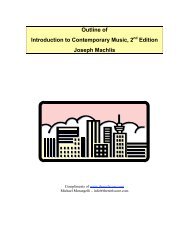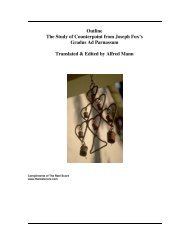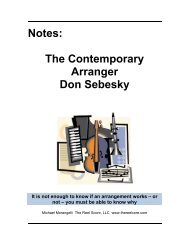An Outline of The History of Western Music Grout ... - The Reel Score
An Outline of The History of Western Music Grout ... - The Reel Score
An Outline of The History of Western Music Grout ... - The Reel Score
You also want an ePaper? Increase the reach of your titles
YUMPU automatically turns print PDFs into web optimized ePapers that Google loves.
4. Benjamin Britten (1913-1976) - the most prolific and best-known English composer <strong>of</strong><br />
the the mid-20th century and distinguished especially for his choral compositions,<br />
songs, and opera<br />
5. Michael Tippett (1905-1998) - open to historical, traditional ethnic, & non-<strong>Western</strong><br />
styles and materials<br />
6. New <strong>Music</strong> Manchester group<br />
a) Alexander Goehr (b. 1932)<br />
b) Peter Maxwell Davies (b. 1934)<br />
c) Harrison Birtwestle (b. 1934)<br />
E. Germany<br />
1. Harbored the most aggressive nationalism between the two world wars<br />
a) Nazis did try to enforce a kind <strong>of</strong> national purity<br />
b) Led to a dissolution <strong>of</strong> its creative forces - some <strong>of</strong> its most talented musicians took<br />
refuge abroad<br />
2. Paul Hindemith (1895-1963)<br />
a) disturbed by the widening gulf between composers and an increasingly passive<br />
public in the late 20's & 30's he began to compose "Gebrauchsmusik" - music for<br />
use as opposed the music for its own sake<br />
b) followed a new harmonic method which he called "harmonic fluctuation"<br />
1: fairly consonant chords progress toward combinations containing greater<br />
tension & dissonance<br />
2: which are then resolved either suddenly or by slowly moderating the tension<br />
until consonance is reached again<br />
3. Carl Orff (1895-1982) - along with Kodály's method and materials he won a following<br />
among educators in many countries<br />
4. Kurt Weill (1900-1950)<br />
a) two careers<br />
1: as an opera composer in Berlin - embracing Gebrauchsmusik<br />
2: as a Broadway composer in New York<br />
F. Latin America<br />
1. Heitor Villa-Lobos (1887-1959) - Brazilian, made use <strong>of</strong> Brazilian rhythms &<br />
sonorities<br />
2. Silvestre Revueltas (1898-1940) - Mexican<br />
3. Carlos Chávez (1899-1978)<br />
4. Alberto Ginastera (1916-1983) - Argentinian<br />
G. Neo-Classicism in France<br />
1. Neo-Classicism represented a broad movement from the 1910's into the 1950's<br />
a) composers revived, imitated, or evoked the styles, genres, and forms <strong>of</strong> pre-<br />
Romantic music, especially <strong>of</strong> what we now call the Baroque & Classic<br />
b) many mid-20th century works hark back to earlier procedures - but in less obvious<br />
ways<br />
c) composers tried to absorb the more experimental elements from the previous<br />
decades while maintaining continuity with tradition<br />
1: held to some recognizably familiar features <strong>of</strong> the past





